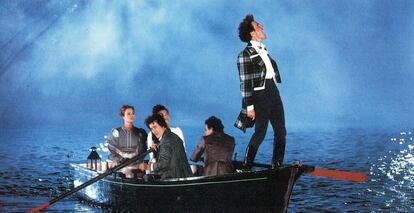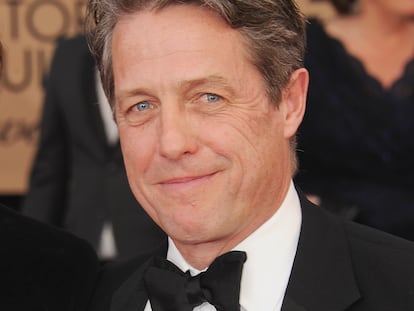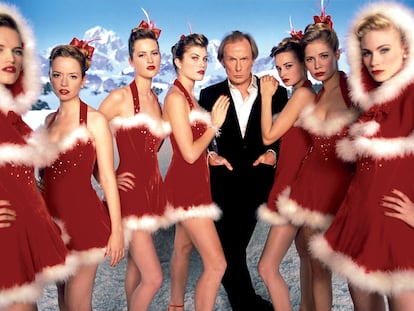Hugh Grant: ‘Do you know what I miss? When the internet didn’t exist’
The British actor turns to horror with ‘Heretic,’ in which he plays a predator who captures two Mormon missionaries. ‘People have an image of me based on the characters in Richard Curtis’ films and I’m not like that,’ he confesses

Hugh Grant is not one to be contradicted. And even less so when it comes to himself. “What happens is that you have an image of me based on the characters in Richard Curtis’ films and I’m not like that. In reality, that charming Englishman is a self-portrait of Richard,” says the actor with a smile from ear to ear, which at the same time makes your blood run cold. Curtis, one of his best friends, and to whom Grant presented an honorary Oscar on November 18, is the scriptwriter and/or director of Four Weddings and a Funeral, Notting Hill and Love Actually. “That Hugh is actually Richard.”
Now, the freezing smile... Grant has put that smile to great use in Heretic, his first step into horror cinema, in which he plays a friendly guy who accepts into his home the indoctrinating speech of two young Mormon missionaries who will soon discover that this expert in theology and philosophy who wants to confront their beliefs — the heretic of the title — is actually a predator who is playing with two more victims he is about to swallow. Although before getting to Heretic, Grant returns to the previous issue: “I feel much closer to, I resemble more, the characters in Bridget Jones or About a Boy.” You never know if Grant is answering seriously or being ironic, and of course, the myth of a thousand Hugh Grants, of the actor who is difficult to portray, is not going to collapse in an interview in Spain.
As a child, Grant and his brother, a banker who now lives in New York, went to Mass “every Sunday.” “My father dragged us to the Anglican church. Until one day, when I was 12, we rebelled and said: ‘That’s it.’ And he looked at my mother and said: ‘Well, the boys are right.’ He asked us for the books we had by [biologist and polemicist] Richard Dawkins and became an atheist. And for years, he sent copies as gifts to my aunts, who were very pious.” To enjoy Heretic, is it necessary to hold religious beliefs? “No, for God’s sake, you just have to watch it for fun. It’s not a film about evangelical racism.” That said, it’s again difficult to work out if Grant responds or makes jokes to see which one works.
Over the years, Grant’s career has expanded: from being a timid man who stammers at emotional crossroads, he has gone on to play all kinds of politicians, mobsters, criminals, real historical figures... Is he the perfect actor to play any Englishman? “I bear the imprint of that Englishman Richard left on my career 25 years ago,” he insists in his defense. More seriously, he says of his friend: “Richard is a man who believes that the world can be a better place, and that is why when he writes he thinks a lot about whether it is worth writing another drama with murders in it [he smiles].” And does Grant sometimes miss having a talent like Curtis whisper great lines to him? “Don’t worry, I already know how to whisper my lines myself.”
According to the actor, he has developed a much longer process of character creation over time. “I’ve become more thorough. I put in more and more hours over more and more weeks. And I’ve found that the better I prepare, the better I get. I analyze what my character says, how he says it. In Heretic, about my Mr. Reed, I asked myself: was he born like that, with evil DNA? Or did his mother beat him? What happened at university? Did they kick him out as a professor? Was he already kidnapping students? Boys, girls? All of that brings a richness that the audience doesn’t necessarily know about, but they will certainly feel it,” he says. And, he stresses, he is happy with his method and his career. “There are a lot of actors who, especially when they are successful, open their own production companies and buy books to adapt or look for scripts to make an impression with... I’m not like that at all. I really just read the script and think about whether I’m going to enjoy it, and that’s it.”

Heretic illustrates a terrifying world, where no one is safe, where fears can enter through the door to your house or lurk for visitors once inside. “However, is today’s world,” the actor reflects, “more terrible than it was 20, 50 or 100 years ago? Or is it a fear stirred up by the algorithm?” At that moment, Grant, wearing a tight blue suit, a white shirt. and with snow-white, almost translucent skin, like that of the other great Englishman of cinema, Colin Firth, drums his fingers on his knees and shrugs his shoulders.
Over three decades ago, Grant played another predator, with just as much charm but much younger: he was Lord Byron in Rowing with the Wind, by Gonzalo Suárez. “I have wonderful memories,” he smiles. And for the first time, he warms to his theme: “The budget was really low. Yesterday [Thursday] I was looking for the place where we stayed. I know it was near here. It was called Apartamentos Recoletos, near Colón, could that be it?” Maybe. “I remember perfectly that everything was brown there. Really, everything. And we went rowing on the Retiro lake... The director didn’t speak English, but almost all the cast came from the United Kingdom. So they hired a great translator, bilingual. He came from a university, I don’t know, and that’s why he didn’t know anything about film or acting. And he didn’t have any tact. So he’d come up to you and say things like, ‘Gonzalo says you’re a moron.’” And Grant, melodramatically, drops his head on the table like a dead weight.

Does the passage of time worry you? Do you let yourself be overcome by melancholy? “No, no. I lead a very pleasant life. The only thing that makes me feel down is when my mobile creates one of those musical montages with photos from years ago and you think: ‘Wow, look how happy I was back then.’ Do you know what I miss? When the internet didn’t exist.” He bursts out laughing and looks his interlocutor straight in the eye, perhaps because the most complicated moments in his private life, including his arrest in Los Angeles with a prostitute, occurred before the digital omnipresence. “Every day I am more convinced that the internet has destroyed us, that we were better off in that world.”
Sign up for our weekly newsletter to get more English-language news coverage from EL PAÍS USA Edition
Tu suscripción se está usando en otro dispositivo
¿Quieres añadir otro usuario a tu suscripción?
Si continúas leyendo en este dispositivo, no se podrá leer en el otro.
FlechaTu suscripción se está usando en otro dispositivo y solo puedes acceder a EL PAÍS desde un dispositivo a la vez.
Si quieres compartir tu cuenta, cambia tu suscripción a la modalidad Premium, así podrás añadir otro usuario. Cada uno accederá con su propia cuenta de email, lo que os permitirá personalizar vuestra experiencia en EL PAÍS.
En el caso de no saber quién está usando tu cuenta, te recomendamos cambiar tu contraseña aquí.
Si decides continuar compartiendo tu cuenta, este mensaje se mostrará en tu dispositivo y en el de la otra persona que está usando tu cuenta de forma indefinida, afectando a tu experiencia de lectura. Puedes consultar aquí los términos y condiciones de la suscripción digital.











































